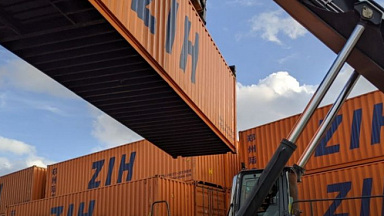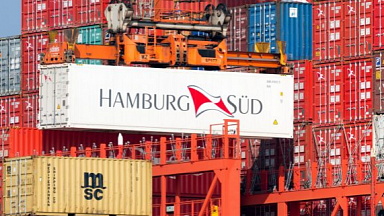The new transport links serve the «Baltic Sea Bridge» — a transport corridor between Mukran and Xian in central China, which has now established a permanent part of the New Silk Road. Just as the port of Rostock, Mukran has frequent shipping lines with Kaliningrad, a Russian enclave on the other side of the Baltic Sea. This sea leg is part of the journey that is further carried out by rail. Mukran Port can thus further strengthen its hub function in international freight traffic with China.
Importance
«The new services are an excellent addition to our existing network, which already includes numerous hubs in Germany and the Baltic Sea region. We are now connecting further markets in Scandinavia and continental Europe to China», says Harm Sievers, Managing Director of Mukran Port Terminals GmbH, summarising the importance of the new connections.
In order to continue to handle the increasing demand on the Baltic Sea Bridge, the capacities on the sea route to Baltijsk (Kaliningrad) were doubled. Since mid-October, a second ship, the «Ulrike G», has been in service there. «Once again Mukran can thus demonstrate its capabilities as a modern multi-functional port and European hub for China traffic», says Arne Ehlers, Managing Director of the shipping company BREB, which handles the charter process for Baltic Sea Bridge.
Teamwork for China transports
The targeted expansion of the China traffic is based on close cooperation between Mukran Port, DBO Bahnoperator GmbH and Eisenbahngesellschaft Potsdam mbH (EGP). The cargo capacity for the connection of Scandinavia to the New Silk Road was chartered by the shipping company DFDS especially for this purpose.
Currently the partners are jointly developing a direct container train line between Mukran and Rotterdam. Here they are initially planning a weekly departure in both directions too. As confirmed by the first test phase in September and October with several round-trips, the train will need just 36 hours for the 1,800-kilometer rail route, including the respective terminal services in the ports.
The operator is EGP, which also handles the ElbePort Wittenberge. This trimodal transshipment terminal in Brandenburg enables the cooperation partners to further expand the short sea traffic between Mukran, the Kaliningrad region, Sweden and Lithuania in the container sector in a targeted manner. The ElbePort offers access to overseas connections via for example Bremerhaven and Hamburg. A connection via Cuxhaven to Great Britain is in preparation.
Time efficient
«Thanks to its geographical location, Mukran Port is the ideal logistics hub for these transports between Asia and Europe», says Marcel Stein, Managing Director of DBO Bahnoperator GmbH. «The Xian route in Central China-Mukran is much more time-efficient for these transports than the traditional overland route via Poland and Germany, from where onward transports to Scandinavia and the Baltic States are carried out. In addition, the handling via Mukran also enables us to handle trains for Western Europe with up to 50×40ft containers in the same way as in China».
Christian Becken, authorised Signatory and Project Manager for intermodal transport at EGP, mentions another advantage of the rail link via Mukran in addition to saving time: «On this connection we can use a train of 740 meters length. This is a significant increase in train length compared to the Polish infrastructure and enables us to combine transports between China and Europe, but also within Germany and Europe». EGP uses modern electric locomotives owned by the company as well as its own container wagons for the transports.
About Mukran Port
Germany’s easternmost deepwater port is located directly on the open sea. Therefore, time-consuming trips to the port area are not necessary. There is also no pilotage obligation. The port’s own railway company Baltic Port Rail Mukran is responsible for the railway logistics at the location. It organises the provision, collection and shunting services of wagons. The port and station area has a total of around 90 kilometres of track.
Baltic Sea Bridge is a brand and business unit of Mukran Port Terminals GmbH und Co KG. The aim is the complete development of the Silk Road corridor across the port and industrial zone of Mukran as well as the acceptance of short sea container loads. Baltic Sea Bridge acts as an interface of the United Transport and Logistics Company — Eurasian Rail Alliance (UTLC ERA) to Western Europe. UTLC ERA provides services for the transport of containers by regular container block trains on the China-Europe-China route through the territories of the Republic of Kazakhstan, the Russian Federation and the Republic of Belarus.




